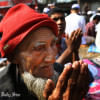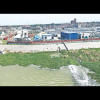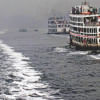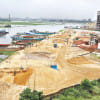WB to steer Dhaka rivers back to life

The World Bank has agreed to take lead in a landmark project to breathe life back into the five rivers surrounding Dhaka city involving about $20 billion.
"Whenever we go to countries where the World Bank has largescale operations, we can see the World Bank's imprint on the country. But in Bangladesh, there is no signage of the World Bank. You cannot tell that the World Bank is here," said Finance Minister AHM Mustafa Kamal recalling his conversation with Hartwig Schafer, the WB's former vice-president for the South Asia region.
He then asked Schafer to take on a seminal project in Bangladesh.
"Do something here so that people remember the World Bank for ages," Kamal told a press briefing on Sunday after a meeting with Schafer's successor Martin Raiser.
During the conversation with Schafer, Kamal mentioned the impact the development of Hatirjheel had on Dhaka city. That's when the germ for the project was conceived.
"Dhaka is surrounded by rivers and we can do the same with those water bodies. Those rivers will not be lost. And those riverways will help us geographically and also financially. And they said done," Kamal added.
The WB is now providing technical assistance to develop an umbrella investment programme (UIP) design for the restoration of the five rivers surrounding the capital: Buriganga, Shitalakhya, Balu, Turag (including Tongi canal) and Dhaleshwari.
High population growth, unplanned urbanisation, encroachment of rivers and canals, and dumping of solid waste, discharging industrial wastes and untreated sewage into these rivers have made "water quality unusable for any purpose", the WB said in the inception report for the technical assistance.
Urbanisation, often encroaching on the city's vast flood plains, has jeopardised its unique river morphology and its lifeline.
"The restoration of Dhaka rivers and their respective services is a complex challenge, requiring an integrated and well-coordinated approach on a large scale," the WB said, adding that it has experience supporting similar river restorations programmes in the Netherlands, Singapore, Vietnam, India, Indonesia, Colombia and the US.
While the government has already taken steps to this end, there is "a pressing need to step up the efforts".
The Dhaka River Master Plan approved by Prime Minister Sheikh Hasina in 2019 to free all major rivers in and around Dhaka and Chattogram cities from encroachment and pollution by 2030 forms the starting point for the UIP.
"The problems are of such a scale that no project on its own will solve all problems, and all efforts -- large and small -- will continue to some extent to the needed improvement."
The UIP requires enormous investments, exceeding the available funds that are available, the WB said.
"There is not enough money -- and capacity as well – to realise all proposed projects, at least right away."
Subsequently, the WB suggested splitting the programme into three phases: short-term development until 2025, medium-term development from 2026 to 2030, and long-term development after 2030.
The seven development issues identified by the WB are: river pollution, illegal encroachment and management of the use of riverbanks, circulation and navigability, cleaning the riverbed (focused on dredging), beautification and living standards, water flows and climate resistance.
As per preliminary estimates, $20 billion would be needed for the programme.
The WB will act as the lead financier and bring in funding from other donors, according to officials from the Economic Relations Division.
Once the WB hands in the technical assistance report in April next year, the government would decide on the next plan of action, Sharifa Khan, ERD secretary, told the press briefing on Sunday.
The existing river-based plans including the Dhaka River Master Plan, Clean Dhaka Master Plan-2018-2032 and the status of the projects being taken under these plans will be reviewed by the WB for the report.
It will also recommend financing strategies for the investment programme.
Local governments on both sides of the rivers have an interest in the restoration of the Dhaka rivers, so their opinion would be solicited for the report.
All government agencies, from Dhaka Water and Sewerage Authority to Bangladesh Inland Water Transport Authority, Rajuk and so on will be brought on board for the UIP.


 For all latest news, follow The Daily Star's Google News channel.
For all latest news, follow The Daily Star's Google News channel. 








Comments